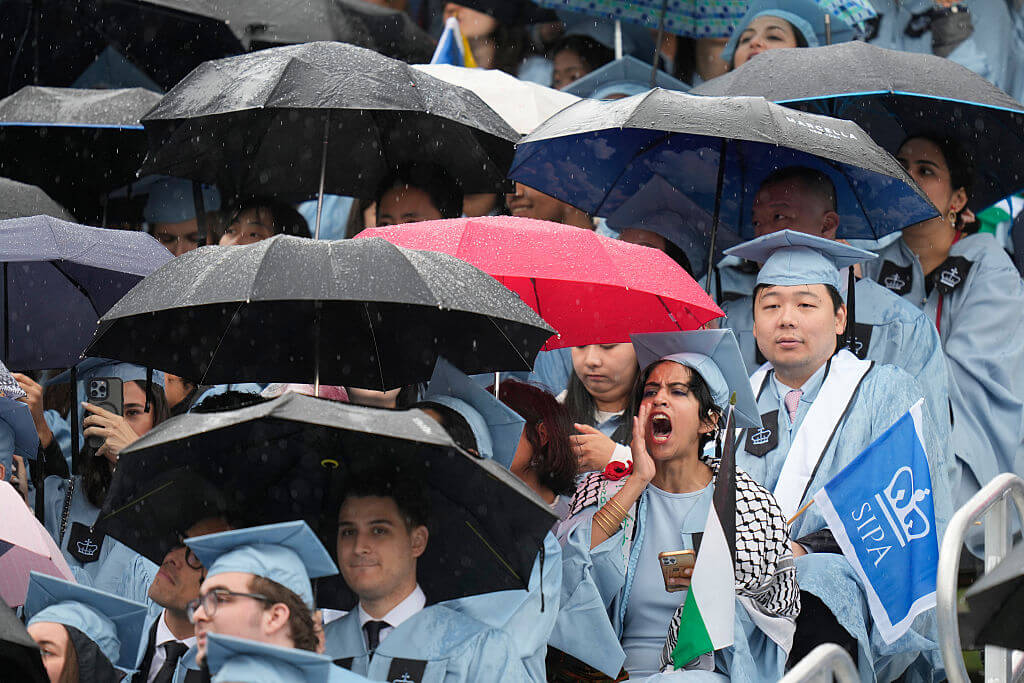At Columbia’s commencement, Mahmoud Khalil and free speech loom large
Acting President Claire Shipman said international students ‘have the same rights to freedom of speech as everyone else’

A student boo’s as Columbia University’s president Claire Shipman speaks during the Commencement Ceremony at Columbia. Photo by Seth Wenig via Getty Images
Columbia University has been at the epicenter of campus unrest over the Israel-Hamas war — and at Wednesday’s graduation ceremony, acting President Claire Shipman did not ignore the moment.
“We firmly believe that our international students have the same rights to freedom of speech as everyone else, and they should not be targeted by the government for exercising that right,” she told the crowd. “And let me also say that I know many in our community today are mourning the absence of our graduate, Mahmoud Khalil.”
Khalil, a Columbia graduate student who took a leading role in campus pro-Palestinian protests, completed work on his master’s degree in December, and was set to graduate this week. He remains in detention in Jena, La. after immigration authorities arrested him in March. The Trump administration has sought to deport Khalil, a green card holder, who it claims would “severely undermine” the U.S. foreign-policy of “condoning antisemitic conduct.” Khalil’s lawyers argue he is being retaliated against for his role in campus protests.
At an earlier graduation ceremony on Tuesday, students booed Shipman and chanted “Free Mahmoud.”
“I know that many of you feel some amount of frustration with me, and I know you feel it with the administration,” Shipman said amidst the chants. “And I know that we have a strong, strong tradition of free speech at this university. And I am always open to feedback, which I am getting right now.”
At the graduation ceremony for Columbia University’s School of International and Public Affairs, where Khalil was supposed to graduate, student speaker Felix Wang noted Khalil’s absence, calling it “unlawful detainment.”
“As Columbia graduates, how do we go out and represent this name?” Wang asked. “A name no longer known for its proud legacy, but for its capitulation. Not for its scholarship, but for its silence.”
Mohsen Mahdawi — a Columbia undergraduate who had been detained for two weeks before a federal judge ordered his release in May — walked across the stage on Monday at the graduation ceremony for Columbia’s School of General Studies. Mahdawi, a co-founder of Columbia’s Palestinian Student Union who led demonstrations on campus, received a standing ovation from the crowd.
At Wednesday’s ceremony, Shipman spoke of the fragility of democracy, recalling her time as a journalist in the Soviet Union, She had watched an authoritarian regime collapse — and saw how censorship eroded public trust. Those same warning signs, she said, are appearing again.
“Identifying which institutions and rights will need to be secured, what will need to be reimagined for democracy to thrive, this is the essential work of your generation,” she said. “You have the wisdom and the moral clarity to do it.”
“Academic institutions like ours, and even this moment right now, they’re pillars of a healthy, functioning democratic nation.”
After losing $400 million in federal grants, Columbia in March agreed to sweeping reforms the Trump administration had demanded, citing the university’s failure to protect students “from antisemitic violence and harassment.” The agreement included reviewing Columbia’s admissions procedures and overhauling its protest policies, security practices and Middle Eastern studies department.
Shipman became acting president shortly thereafter, when interim president Katrina Armstrong stepped down amid attacks from the Trump administration that she was not committed to implementing the changes.















